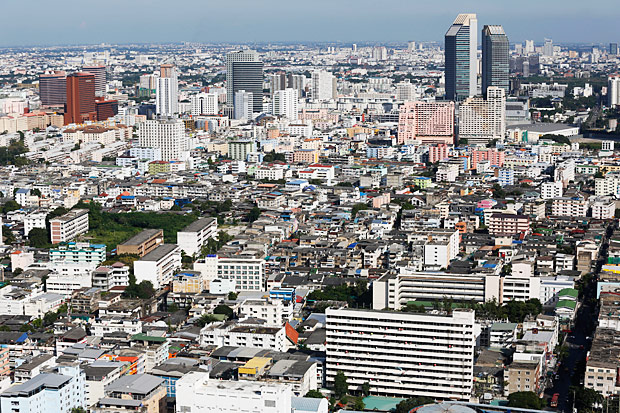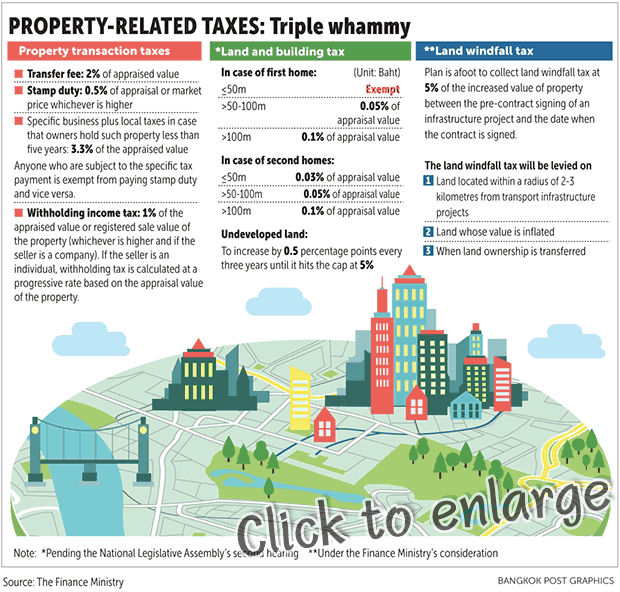Property owners brace for the bite
A barrage of new taxes is in store for holders of land, houses and buildings, but the government says concerns about unfairness and overlapping levies are misplaced. By Wichit Chantanusornsiri and Kanana Katharangsiporn
- Published: 11 Jul 2017 at 06:30 0 comments
- NEWSPAPER SECTION: Business | WRITER: Wichit Chantanusornsiri & Kanana Katharangsiporn

An aerial view of Bangkok shows high-rise buildings and residential areas. Property owners are facing a trifecta of new taxes. PATTANAPONG HIRUNARD
'Nothing can be said to be certain, except death and taxes," said Benjamin Franklin, one of the founding fathers of the United States.
For Thais owning land, houses and buildings in Bangkok, taxation is threatening to become a nightmare certainty with the government looking to impose a series of asset-based taxes.
Inheritance tax was this government's first asset-based tax, which came into effect early last year. The land and buildings tax and land windfall tax are set to follow.
Changes to the tax structure, according to authorities, are being made to widen the government's source of income from assets and narrow income disparity.
Under the new inheritance tax, direct descendants are charged 5% on inheritance above 100 million baht and 10% is charged to other beneficiaries.
A bill on the land and buildings tax is now going through its second reading in the National Legislative Assembly (NLA). The bill calls for taxes to be levied on first-home owners and farmland worth more than 50 million baht.
A tax rate of 0.05% will be applied to first homes and agricultural land worth 50-100 million baht, and a 0.1% rate for homes over 100 million. People owning second homes will be taxed 0.03-0.1% of the appraisal price, depending on the value of the property.
Tax on vacant land will rise by 0.5 percentage points every three years, up to a cap of 5%, while land for commercial and industrial use will be levied at 0.3-1.5%. The tax is expected to be enforced next year.
A land windfall tax is now also getting closer to becoming a reality, with the Finance Ministry expected to propose the tax for cabinet approval sometime very soon to trace landowners whose land value is inflated and enjoy higher windfalls from big-ticket infrastructure developments.
A maximum 5% rate has been widely adopted in many countries.
The land windfall tax has just undergone a public hearing, which concluded on June 28.
According to a Fiscal Policy Office (FPO) paper on the public hearing, it was proposed that landlords whose land value is inflated will be charged land windfall tax every time ownership is transferred from the time when an infrastructure project's contract is signed until its completion.
After transport projects begin operations, those owning land for residential and agricultural purposes will not be liable to pay the tax, while those who have land for commercial use and whose land value is higher than 50 million baht will be subject to the tax upon ownership transfer.
Only property developers with a project value of more than 50 million baht will be taxed in the event that land ownership is transferred after an infrastructure project is launched.
But a one-shot tax will apply to cases in which land ownership is transferred after a transport infrastructure project starts, the FPO says. This means other landlords on a plot for which the tax has been paid would no longer be subject to the tax.
Owners of land located close to infrastructure projects launched before the windfall tax takes effect will be exempt from the new tax.
Those who are liable for the tax must also own land within a radius of 2-3 kilometres from an infrastructure project such as an electric train station.
If the bill on land windfall tax wins cabinet approval, it will be forwarded to the NLA for deliberation and a vote before being introduced.
Some wealthy figures, landlords and property developers are questioning the state's move to impose several asset-based taxes, saying they risk being double-taxed because Thailand already has property taxes targeting individuals and businesses.
Prasert Taedullayasatit, president of the Thai Condominium Association, says the government should use the existing tax structure and improve land appraisals, which should be frequently updated.
"All property transactions have taxes calculated by land price appraisals," he says. "The new taxes will be repeating existing ones."
Kitipong Urapeepatanapong, chairman of Baker McKenzie in Bangkok, wants the government to simplify and make property taxes more reasonable, as sellers and buyers will be liable for a series of taxes.
According to Land Department data, taxes on selling a property, in the case of individuals, include a transfer fee of 2% of the appraisal value, stamp duty of 0.5% of the appraisal or market value -- whichever is higher -- and 3.3% for specific business tax, plus other local taxes in the event that owners have held the property for less than five years. Sellers who have owned a property for less than five years are tax-exempt if their names have appeared on the household registration for at least one year.
Anyone who is subject to the specific business tax payment is exempt from paying stamp duty, and vice versa.
Furthermore, sellers are subject to a withholding income tax whose amount depends on years of possession upon property transfer.
Juristic persons, like individuals, are also liable for a transfer fee, stamp duty and specific business tax. In addition, they must pay a 1% withholding income tax.
Mr Kitipong says the planned enforcement of the land windfall tax will add more expense and confusion to the already-overlapping property taxes. He says the Finance Ministry should look at all taxes related to property transactions and compare them with those collected overseas to create fairness and be appropriate.
Mr Kitipong threw his support behind the land and buildings tax because it will replace existing taxes, but he expressed concern about the 50-million-baht tax exemption ceiling for the first home.
The ceiling is too high, he says, and the Finance Ministry should lower the tax exemption cap and start imposing the tax from a lower rate.
Surachet Kongcheep, research department associate director at Colliers International Thailand, says it might be difficult to use transacted prices to calculate income tax because landlords and buyers are generally not willing to report the actual selling price.
"It is also hard [for government agencies] to examine the selling price that buyers and sellers agree to," he says. "Instead, the government should update appraised land prices frequently, possibly every year."
If the government uses the value publicly quoted from a previous transaction, it will be unfair because land value, even if in the same vicinity or a nearby location, varies by size, shape and other factors such as access, Mr Surachet says.
Using transaction amounts garnered from news, announcements or a property consultant's market research to estimate value is also unfair because the information is limited in some locations like Bangkok's central business district and is not available citywide or nationwide, he says.
A landlord who owns many land plots in Bangkok's outskirts says the taxation will have a minimal impact on a decision to sell or keep land, as any expense incurred will be added to the selling price.
Nonetheless, Krisada Chinavicharana, director-general of the FPO, insists there will be no overlapping tax payments or double taxation once the new property taxes are introduced.
The land and buildings tax, in particular, has nothing to do with a change in price incurred from real estate transactions, he says, noting that the tax is also aimed at replacing the outdated house and land tax and local development tax.
The land and buildings tax will also be fairer, Mr Krisada says, since the levies are relatively low with a 50-million-baht tax exemption for the first home and farmland.
As for the land windfall tax, he says that the levy will only affect owners of land with an inflated price due to government infrastructure projects and that the tax will only be imposed when land ownership is transferred.
"The tax is charged on the inflated price resulting from state investment," Mr Krisada says. "That means owners have higher wealth and only part of that increased wealth will be allocated to the government."


0 people commented about the above
Readers are urged not to submit comments that may cause legal dispute including slanderous, vulgar or violent language, incorrectly spelt names, discuss moderation action, quotes with no source or anything deemed critical of the monarchy. More information in our terms of use.
Please use our forum for more candid, lengthy, conversational and open discussion between one another.
Click here to view more comments